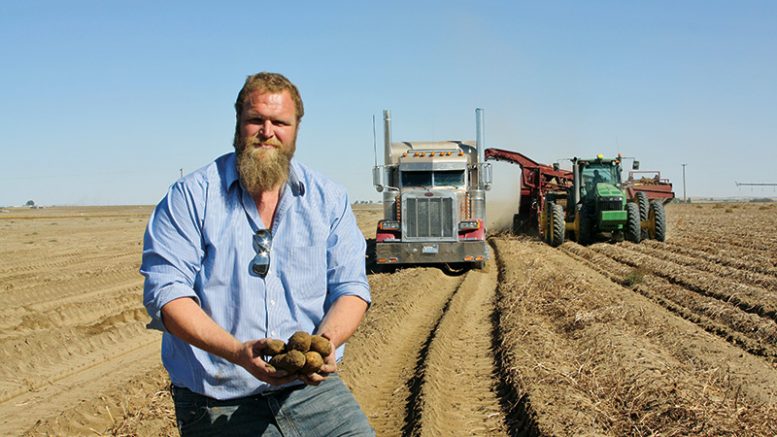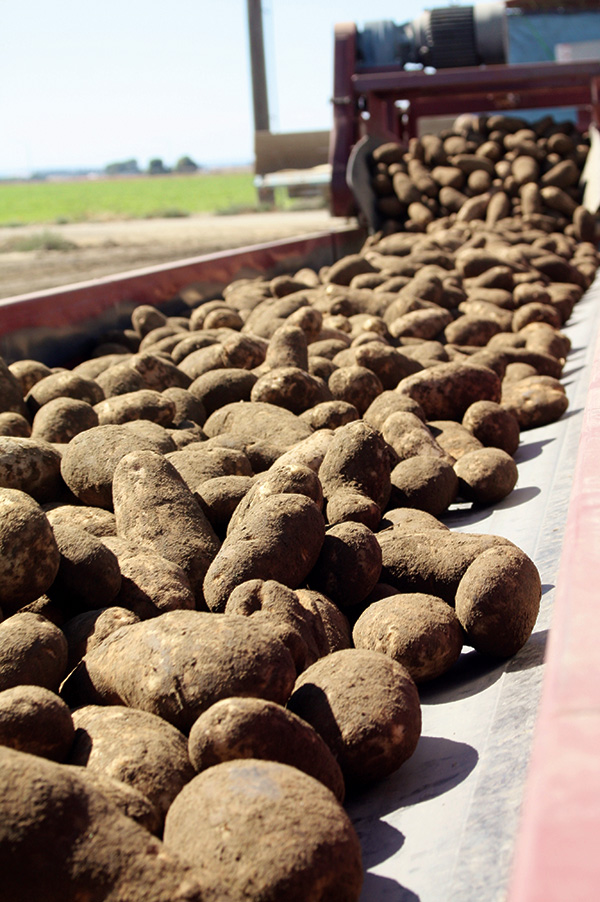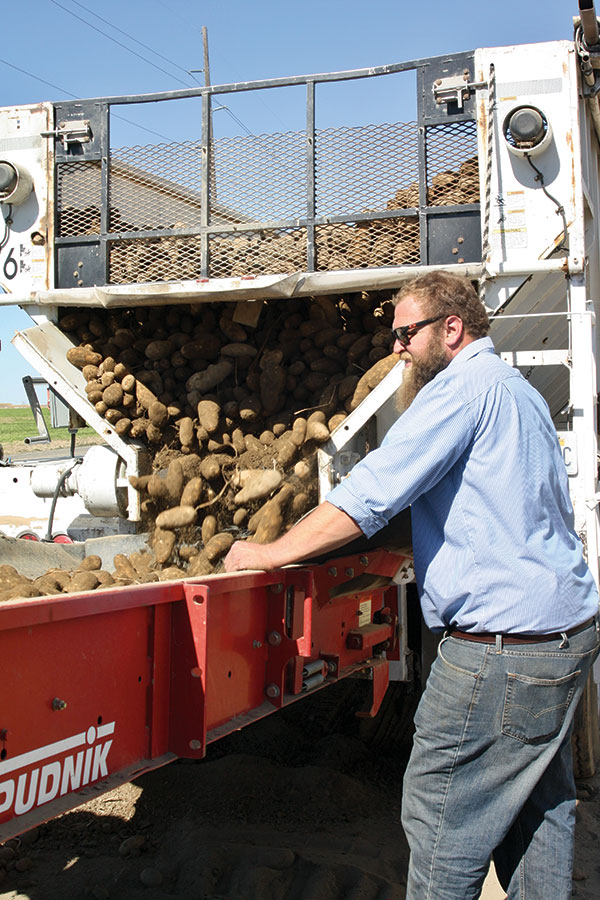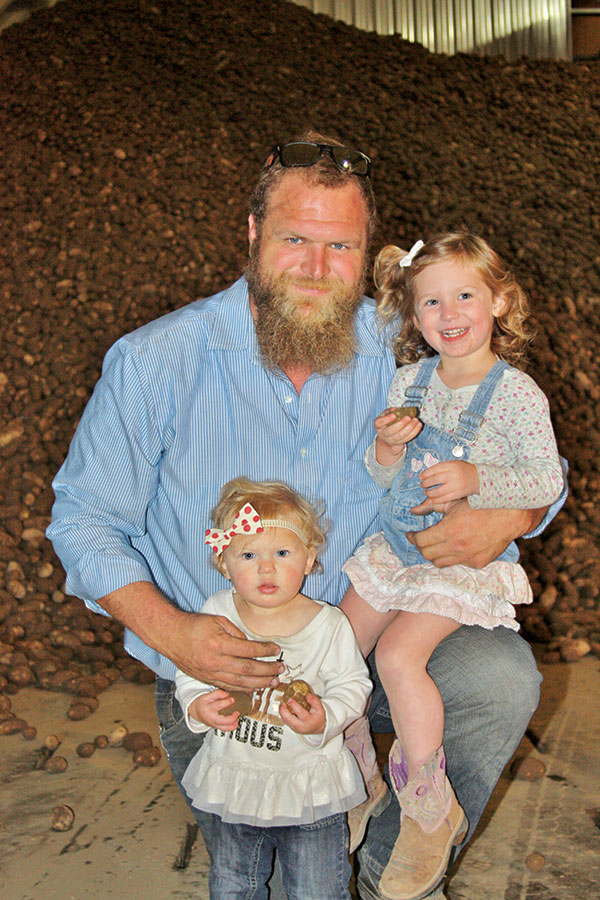Story and photos by Denise Keller, Editor
James Baker tries to strike a balance between perfection and profitability. The Moses Lake, Washington, potato grower is making changes to his operation in an effort to produce a quality crop while working within today’s tight margins.
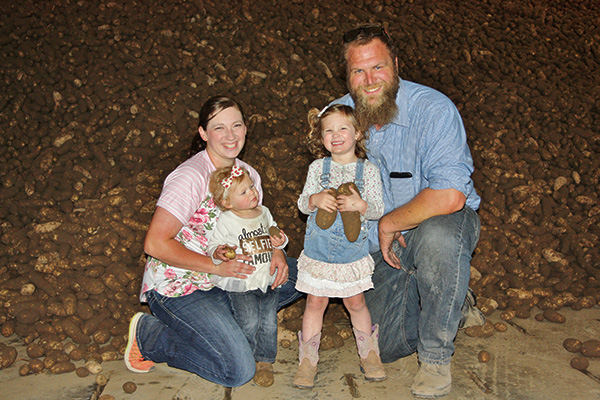
James Baker, pictured with his wife, Niki, and daughters Katy and Sally, has been farming on his own since 2016.
In His Blood
Baker has long been familiar with how difficult farming can be. Both of his grandfathers farmed in the area, and his dad followed suit, growing potatoes and sugar beets. His father was heavily invested in a local sugar factory. When the sugar factory failed in the early 2000s, he had to sell his farm. But Baker’s dream of farming didn’t end with the sale of his father’s farm.
“I always knew I wanted to be a farmer. I grew up in a spud field,” Baker says. “I couldn’t get it out of my blood.”
In 2008, Baker partnered with his father, uncle and cousin to get back into the potato business. Through the USDA Farm Service Agency Beginning Farmer loan program, Baker started with 50 acres of potatoes and was soon managing 350 acres in the partnership. The four farmed together until 2015 when the other three partners left the business. Baker took over the operation with 1,000 acres of potatoes and has been farming on his own since 2016.
Price of Perfection
Today, Baker grows about 1,200 acres of Umatilla Russets and Russet Burbanks for the processing market. All of his production is on rented ground, which he says makes operations especially tight financially.
“As a tenant farmer, I’m running a $5 million operation with a $50,000 margin. There’s no cushion when you have a bad field. It takes years to recover,” Baker shares. “There’s no reason for it. Sales are up. Processors are making record profits. They have plenty of margins. And they’re not willing to pass it down to the grower.”
Every year is a make-or-break year. Baker says he has been “almost out of business” every year he’s been in business. With little room for error, he feels the pressure to grow perfect spuds every season, but he says perfection doesn’t pay.
“The price isn’t there to raise perfection. My dad and uncle were the-ends-justify-the-means farmers. They would spend whatever it took to raise a really nice crop. The problem is the contract doesn’t support that,” he explains.
Recalling his 2015 crop, Baker says he delivered 39.5 tons per acre to the plant and maxed out quality. But he spent so much in doing so that he lost money on the “primo crop,” he says.
The season was an eye opener for Baker and prompted him to make changes when he began farming on his own. He now strives to balance crop quality with cost savings. Changes have been minor, and many focus on the timing of irrigation and fertilizer applications. He also has adjusted his approach to other chemical applications in the field. He’s gone away from pre-scheduled fungicide applications and now scouts fields and applies fungicides only as needed and when justified by the potential gains. In addition, the grower has switched from applying herbicides through the pivot to applying them with a dammer diker in the spring. This method has been less expensive and more effective, he says. Baker also cut out some of the “snake oils” previously used on the farm and maintains that not all farm equipment needs to be brand new.
At the same time, however, he recognizes the requirement to produce quality potatoes in order to retain his processing contract. There’s an extent to which he can cut corners, he says.
“As potato growers, we want a quality crop because we put so much time and effort into the crop. But a lot of times, as potato growers, we forget that we’re businessmen,” he points out. “It’s still quality. But it’s not quality at all costs.”
Addicted to the Stress
Along with tight margins, Baker faces additional growing challenges including the unfamiliarity with each field that is inherent in renting ground. Recently, the grower has been dealing with increasing nematode populations. With lighter-rate fumigations decreasing in efficacy, Baker is spending more money on fumigation each year.
But despite the challenges, Baker continues to farm due to a little bit of luck and a lot of love for the job.
“I get addicted to the stress and challenge of farming. When I look at something else, there’s nothing that competes with it. I can’t find anything else as challenging,” he smiles.
Looking ahead, Baker sees a need to gain more control over his field rotation by obtaining long-term leases and beginning to also grow rotation crops. Ultimately, he hopes to build the farm to a point that would allow him to help his kids pursue the opportunity to farm if they so choose.

